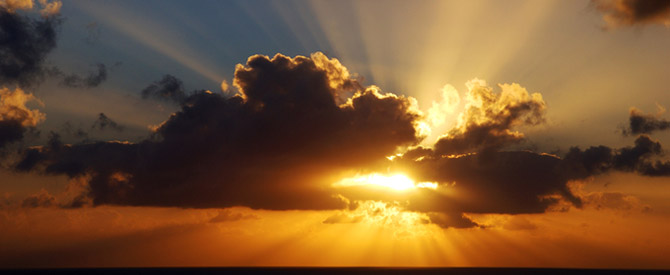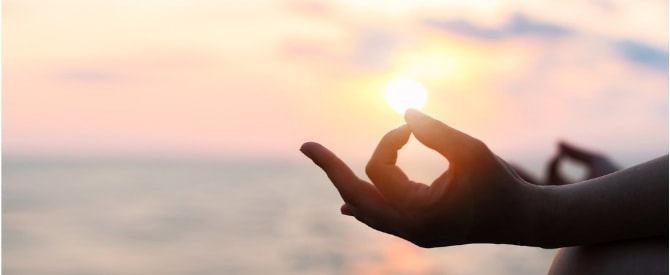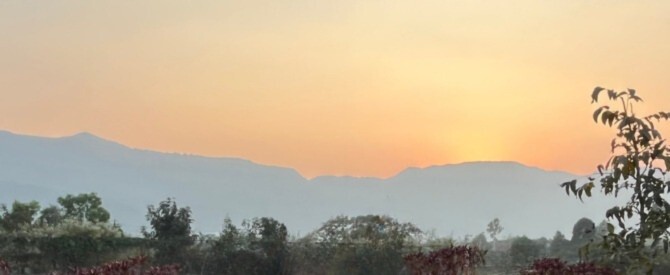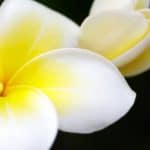An unseen intelligence witnesses every thought, word and deed that we do. It determines when and how we will experience the results of those actions. We can never get away with anything. —Swami Tejomayananda
It is no accident that you are now a human being and not one of the millions of other living species on the planet. Vedanta the spiritual science of life, explains that birth as a human is a result of the merits gained from good actions done in previous lives.[1]
A verse in the Prasnopanisad, an ancient Vedantic text, tells us that we are led upwards to virtuous worlds by good deeds, and to the lower worlds by sinful acts. And when sin and virtue are mixed, we come back to this world as human beings.[2]
Karmic Accounts
I like to think of doing good actions as building a healthy karmic merit account. If we do something hurtful to others, it doesn’t deplete the merit account, but accumulates in a separate demerit account.
We continuously deposit in both accounts.
At the end of our lives, the accounts are tallied and if they are about equal, we get to come back as humans to further our spiritual evolution.
If we accrue an abundance of merits, we shall gain heavenly bodies and go to higher worlds to reap the happy results of what we have sown.
However, the enjoyment does not last forever. When the merits are experienced (used up), we have to leave those worlds.
You could think of it as an all-inclusive vacation that you have worked for and paid in advance. If you paid for a deluxe vacation package, you will experience greater joys. If you paid for the basic package, you will gain joys appropriate to what you paid for.
After you’ve used up all your merits, you will come back to this world as a human.
On the other hand, if the demerit account is greater than the merit account, one will have to suffer the results of one’s actions in a body of the lower species.
This is not as punishment, but as a natural consequence of the baser tendencies that one has acquired through negative thoughts and actions. It is in those bodies that the lower tendencies can freely express themselves. Having done so, the tendencies get exhausted. Unburdened of them, the individual soul can come back in a human body again.
Evolution or devolution only possible in the human body
Now, you may ask what’s so special about being born as a human? It seems as though the goal is to come back as a human being.
You see, it is only in the human body that we have a chance to earn and build our karmic accounts. It is only here that we can evolve or devolve.[3]
In both the higher and lower worlds, all we can do is enjoy or suffer the results of our actions. We can’t accrue any new karmic points, good or bad.
No escaping the results of our actions
In one of his spiritual discourses, Vedantic master, Swami Tejomayananda explained that just as our outer lives are regulated by governmental, societal and other laws, our inner lives are governed by an unseen intelligence. It witnesses every thought, word and deed that we do.
He gave an example of the hidden cameras at traffic junctions. We may think no one saw us run a red light, but the camera did!
The point is, we can’t escape the results of our actions. If we have done good deeds, we will have to reap their happy consequences.
Likewise, if we have done sinful actions that bring suffering to others, we will have to reap the painful consequences of those negative actions.
Acme of Evolution
Thus, going through repeated birth and rebirth, we grow and evolve.
The masters of Vedanta tell us that the acme of evolution and our ultimate purpose is the realization of the divine Self within. This is who we really are.
We are spiritual beings on an evolutionary journey spanning innumerable lifetimes. It is only as humans that can we put in efforts to overcome our mortal limitations and rediscover our true nature.
A human birth is thus sacred and precious. It is a rare and golden opportunity to fulfill the true purpose of our lives.*
*To find out more, read: Finding the purpose of our rare human life.
[1] Swami Tejomayananda, “The Three Bodies” in Tattvabodha of Adi Sankaracarya, (Mumbai: Central Chinmaya Mission Trust, 2013), 41, 44.
[2] Swami Chinmayananda, Prasnopanisad, (Mumbai: Central Chinmaya Mission Trust, 2007), 3:7.
[3] Tejomayananda, “The Three Bodies,” 44.
Like this post? Sign up for the free fortnightly Spiritual Solutions Newsletter and receive the latest articles, news and updates in your email inbox!














Hi Manisha
If we accumulate “good” merit, we get heavenly bodies – when the merits are used up, we come back again as humans – how then do we get not to come back as human but remain in the spiritual plane??
Regards
Dipu
Hello Dipu, Good question! The masters of Vedanta tell us that only in this human embodiment can we meditate and re-discover our innate spiritual nature. This is called Self-Realization. It is the ultimate goal of human existence. When we gain it, we will be liberated from the cycle of birth and rebirth and will not have to be reborn here. Until then, our innate tendencies and attachments will keep pushing us back into the world of matter in some form or the other.